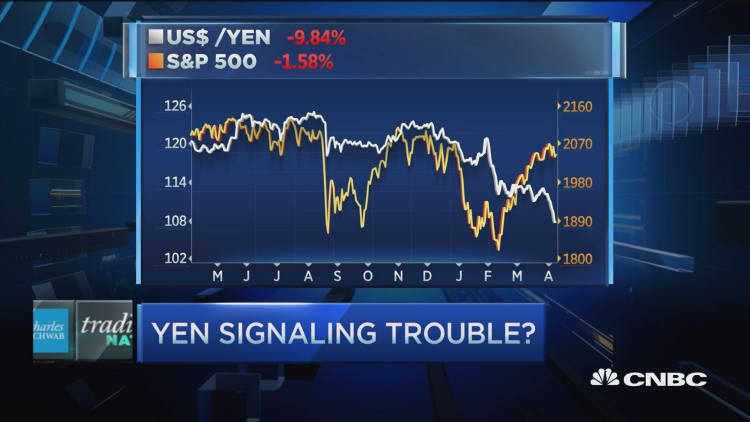
The yen hit a 17-month high against the dollar on Monday in the currency market's latest warning sign to equity investors.
The strength of the this year has been a bit of a surprise for many investors. The Japanese central bank has taken steps this year that could be expected to weaken the yen, most notably the move to negative interest rates. Yet the yen has risen 10 percent versus the U.S. dollar, a huge move for the currency market.
Read More Dollar recoups some losses vs yen on Japan intervention fears
On its face, this might be considered a boon for U.S. companies. After all, as the dollar weakens against the yen, U.S. goods become less expensive for Japanese consumers, which could potentially serve as a tailwind for foreign sales. Similarly, U.S. goods become less expensive as compared to Japanese goods for customers in other countries.
But when it comes to sentiment, it's a different story. The Japanese yen is considered a "risk-off" asset, meaning that it's something that's bought as investors seek safety, and sold as investors embrace risk.
According to many traders, this is not due to the traditional drivers of currency movements — relative inflation, interest and economic growth rates. Rather, it is because the yen is used as a "funding currency." Due to low (and now subzero) Japanese interest rates, it is remarkably cheap to borrow yen in order to fund other investments. Of course, stocks — and U.S. stocks in particular — are among the most popular investments that would be funded.
From this standpoint, the surge in the yen is a disturbing sign indeed.
That is to say, in order to unwind those borrow-yen-to-buy-stocks trades, "they come back and start buying yen," currency trader Boris Schlossberg pointed out Friday on CNBC's "Power Lunch."
"So far, it really hasn't been the case that equities have gone down, but what everybody's worried about is that now that the yen has strengthened, it might signal the fact that smart money's getting out of equities early, because they're afraid that there's just no strength in the equity market," Schlossberg said.
The flipside is that all this positioning that is unrelated to fundamentals has the potential to skew the currency to an unreasonable level. That may be why in the futures market, the gross short position in the Japanese yen has experienced the biggest rise since November, according to Brown Brothers Harriman.
"The yen's surge may be fading soon," the currency strategists at BBH advised in a Monday morning note to clients. "Investors should be keeping a watchful eye for a reversal pattern and other signs that the yen's surge is tiring.
In an interview Monday on CNBC's "Worldwide Exchange," Societe Generale macro strategist Kit Juckes put it a bit blunter.
"It's looking a little bit bonkers to me, where it is now, and if the currency strength and the Japanese equity weakness and economic weakness continue for a few more weeks, we're due for a snapback in the yen," Juckes predicted, adding: "I just wish I knew what level it would happen at."







